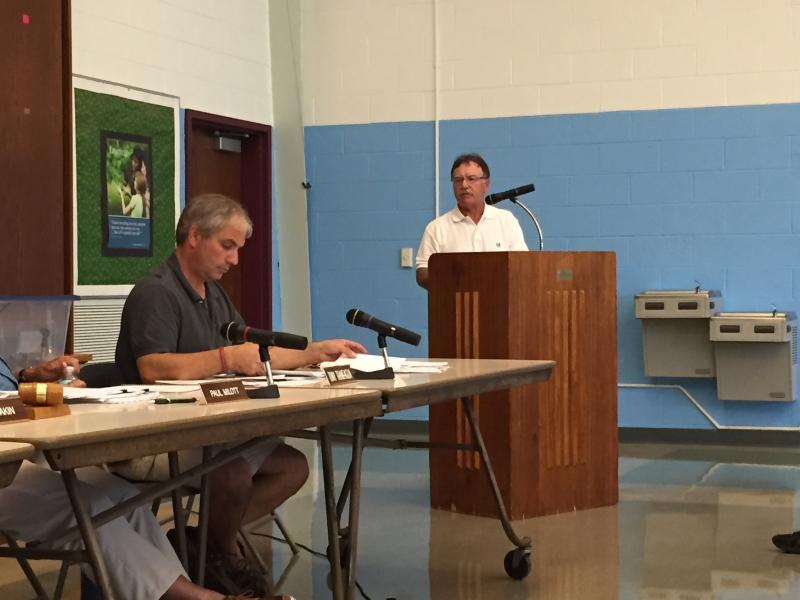Mattapoisett Zoning Board denies Darosas' appeals to build pier
The ongoing saga over a proposed 290-foot pier on Goodspeed Island continued Thursday night as the Zoning Board of Appeals denied two appeals from the property owners.
Daniel and Laurie Darosa, of 3 Goodspeed Island, have met with considerable resistance from the town and residents over the pier, which they want to build on an adjacent property. Many are concerned that the length of the pier will inhibit recreational use of the area and have a negative environmental impact.
Approval from the Conservation Commission was denied last fall, resulting in appeals to the Department of Environmental Protection. The department overturned the local decision, which was then appealed by the town.
In June, the Darosas were again denied two permits, this time a zoning and a building permit from Building Inspector Andy Bobola. With a full house at Old Hammondtown School, the Darosas’ lawyer, John Gushue, presented his argument for reversals from the Zoning Board.
Regarding the zoning permit, Gushue said Bobola’s decision was made with “what we feel is an erroneous interpretation and application of zoning bylaws to this pier.”
In a letter detailing the reasons for the denial, Bobola said the pier’s location on an empty lot meant it was against town bylaws. The Darosas, whose lot overlooks the water but is landlocked, have obtained an easement to build the pier on the adjacent waterfront property. Bobola said an accessory use, in this case the pier, can only be built on a property with an existing primary use, such as a house.
Gushue said the pier complies with permitted uses of the pier, and similar piers have been built. He cited a pier on Mattapoisett Neck Road that was approved in 1998 and is on an easement.
“It’s simply not proper to treat the Darosas differently,” said Gushue. “This very circumstance of a pier serving one property accessing the water via an easement is not unprecedented in Mattapoisett.”
He also asked the board to give a “consistent interpretation and application” of the zoning bylaws.
“These very same zoning bylaws were in place in the 1990s…it’s a precedence. If you’re going to interpret your bylaws differently now, then you’ll have to explain it,” Gushue said.
Zoning Board Chair Susan Akin said the board could only use the current bylaws to make its decision.
An additional comment in Bobola’s letter said the appropriate setback footage was inadequate between the end of the structure and the property boundary.
Gushue suggested Bobola may have been “searching for some reason to deny the pier.”
“Could that be what’s going on?” said Gushue. He later said he understood there to be “much organized opposition even within Town Hall,” to the pier proposal.
In response, Bobola said he took issue with any suggestion that there was an ulterior motive to his decision.
“I think that’s a ludicrous statement for you to say as an attorney,” he said.
Bobola said he discussed his decisions with the town’s attorney before submitting them and was affirmed in his decision. He stood by his reasoning that a structure deemed an accessory use cannot be built on an empty lot.
The bylaw protects the townspeople, he said.
“The other way around would be a disaster for every person and every resident of this community. It was never written that way. It was never approved that way,” Bobola said.
Regarding the denial of a building permit, Bobola maintained it could not be given without the appropriate zoning permit.
Bobola said it wasn’t even under the Zoning Board’s purview to reverse the building permit denial as that was a building zoning issue that would have to be made in Boston.
Before the board made its decisions, several residents spoke up.
Mike Huguenin, speaking on behalf of the Friends of Mattapoisett Harbor, a group of around 260 residents opposed to the pier, said the group trusted Bobola’s decision.
“We feel like Andy’s judgment ought to get a lot of deference,” said Huguenin. “If Andy says it doesn’t meet zoning, it probably doesn’t meet zoning.”
He also said retired attorneys in the community and attorney John Witten, who is town counsel for Marion, agreed with Bobola’s decisions.
The Zoning board had no opposition to Bobola's comments but they did oppose Geshue's. Akin said the 1998 pier was not the same issue, since the pier was built on a lot with a home on it, not an empty lot.
She also said the lack of proper setbacks and the fact that the lot was landlocked meant the pier does not comply with zoning bylaws.
All of the board members agreed, unanimously denying the appeal.
Regarding the building permit, the board said the lack of a zoning permit necessitated a denial of the appeal. The second appeal was unanimously denied.
After the meeting, Geshue said the DEP has already given a verbal approval of the Public Waterfront Act License that was originally denied by the Conservation Commission in the fall.
To further appeal Thursday’s decision, the Darosas must now take their claim to court, likely superior court.
“In all likelihood, that’s what will happen,” said Geshue.















